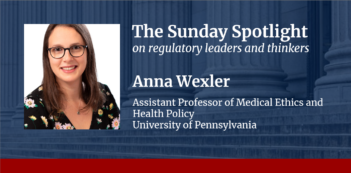
Regulatory news in review
- The Food and Drug Administration (FDA) announced a rule altering standards for labeling sunscreens, limiting the representations sunscreen manufacturers can make to consumers about the SPF and waterproof attributes of their products.
- The Environmental Protection Agency (EPA) announced it would be delaying by two months the issuing of proposed greenhouse gas rules concerning power plants.
- A Republican presidential candidate debate in New Hampshire focused on the burdens of regulation in areas such as health care, energy, and finance. See related The Regulatory Review essay.
- Adam Finkel, Executive Director of the Penn Program on Regulation, testified before the House Small Business Committee‘s hearing, “Lifting the Weight of Regulations: Growing Jobs by Reducing Regulatory Burdens.”
- The EPA issued a proposed rule revising the Land Disposal Restrictions treatment standards to provide more flexibility and certainty to those who treat the disposal of certain hazardous wastes from the production of carbamates.
- The Office of the Comptroller of the Currency (OCC), Federal Reserve, and Federal Deposit Insurance Corporation (FDIC) requested comments on proposed guidance for stress-testing large financial institutions, in order to underscore the importance of the practice.
- The Securities and Exchange Commission (SEC) found that investors in one of Allen Stanford’s many companies were entitled to a SIPA liquidation to restore the investors’ losses from Stanford’s alleged Ponzi scheme. Because the divisions between Allen Stanford’s companies were sufficiently blurred, these investors could recover even though the financial instruments they bought originated in a different Stanford company.
- EPA found “insufficient” the U.S. State Department’s current environmental review of the Keystone XL pipeline, which would move crude oil from Alberta, Canada to refineries in Texas.
- Highlighting concerns of an anti-competitive market, California’s Public Utilities Commission (CPUC) voted to investigate the proposed AT&T and T-Mobile merger, which if it goes forward would lead to one company controlling over 47 percent of the state’s wireless market.



